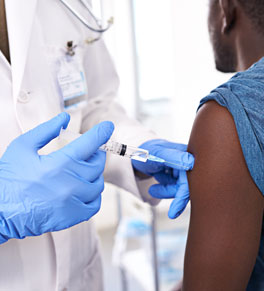This season’s must-have: the COVID-19 vaccine

Even though the pandemic is over, COVID-19 is still killing people.
UCI Health infectious diseases expert Dr. Susan Huang is strongly urging people to get the newest version of the vaccine against the virus when they get their flu shot.
It is also the only vaccine available to protect from the virus. The first two vaccines have been discontinued.
“You are not protected from getting COVID-19 infection if you got the bivalent vaccine last year,” cautions Huang, medical director of UCI Health Epidemiology & Infection Prevention.
Why bother with the COVID-19 vaccine now?
We are no longer in a pandemic, so some may wonder if a vaccine is worth it. Huang absolutely thinks so.
It offers protection against new COVID-19 variants.
“There are many variants floating around right now,” she says. “Any one of them can rise up and become the dominant one.”
The vaccine also lowers the risk of death, hospitalization and long-term COVID-19 complications, which increases with each infection. Unvaccinated individuals who have their first COVID-19 infection have a 35% risk of developing complications. By the second infection, the risk rises to 200%. By the third, the risk is up to 300%.
The death risk from COVID-19 is also twice that of flu.
“Vaccinate, vaccinate, vaccinate,” urges Huang. “You want this vaccine."
Vaccine safety
Most importantly, Huang says, “the vaccines are proven to be safe. We know more about these vaccines than any other vaccine on the market. They are incredibly well-studied.”
The vaccine does not contain the coronavirus, but rather messenger ribonucleic acid (mRNA), which instructs the body to make a protein resembling the virus’ tell-tale spike and then generate antibodies to kill the virus. The mRNA code is also destroyed by the body.
Breakthrough COVID-19 cases do occur in people who have been vaccinated, but the symptoms are usually mild. Some people have no symptoms but can still transmit the virus.
“By getting vaccinated, you don’t have to risk the uncertainty of a severe infection, which can happen at any time,” she says.
Preparing for your appointment
For best results, Huang recommends planning ahead, especially if you have felt worn out after previous COVID-19 vaccinations.
Those side effects — fatigue, headaches, muscle aches, chills and joint pain — indicate a successful immune response.
The shots are most effective with fewer side effects when you are well-rested, well-hydrated and well-fed.
“If you schedule it and plan for it, you can recover much faster,” she says.
Do not pre-emptively take acetaminophen or ibuprofen in anticipation of side effects, she cautions. It blunts the immune system’s response to the vaccine.
"It's OK to take them after symptoms arise, but only if they are causing discomfort,” she says. “By then, your immune system is activated.”
Staying well this fall and winter
Even after vaccination, everyone should take preventative measures to keep themselves and those around them well, Huang says.
Her tips:
- Carry a mask in case you’re in close quarters with others who are ill.
- Wear a mask when you are near people who are sick or if you feel unwell.
- Don’t eat with people who are even mildly ill.
- Wash your hands after handling common objects such as public doorknobs and serving spoons for group gatherings.
- Encourage others to get vaccinated.
- Stay home if you are experiencing fever, diarrhea, vomiting, coughing, sneezing or if you cannot mask around others because of needing to frequently cough up mucus or blow your nose.
Testing for the virus
If you’ve been exposed to someone with COVID-19, the Centers for Disease Control and Prevention recommends wearing a mask around others and getting tested as soon as possible.
If you test positive, you should isolate yourself for at least five days and wear a mask around others, even if you are asymptomatic, according to the California Department of Public Health.
Call your doctor or go to an urgent care center if you test positive and are experiencing symptoms, state health officials say, because COVID-19 treatment must begin five to seven days after the onset of illness, even if symptoms are mild. Treatment is recommended for older adults or those with health problems that may cause a higher risk of severe illness.
Free COVID-19 tests are available at covidtests.gov.
Related stories
Explore Further
Browse more blog posts by topic.




